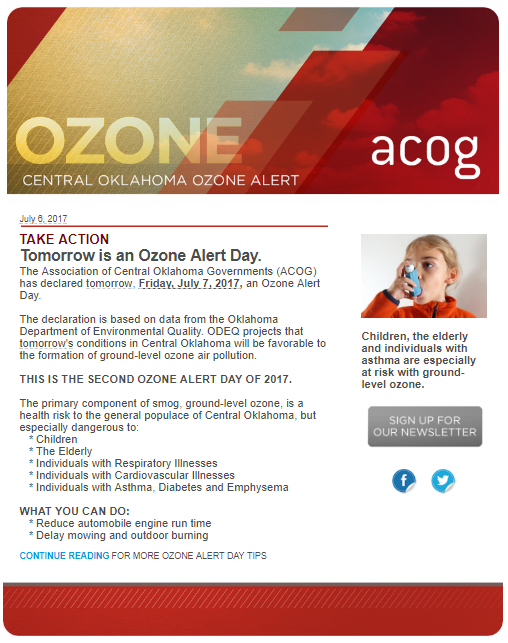The Association of Central Oklahoma Governments (ACOG) in partnership with the Oklahoma Department of Environmental Quality (ODEQ) has issued an OZONE ALERT DAY for the Oklahoma City metropolitan region for Friday, July 7, 2017.
According to ODEQ, air quality monitors in Oklahoma County now detect concentrations of ozone considered unhealthy for sensitive groups. Children and persons with asthma should avoid prolonged outdoor exertion. Persons with lung or heart disease should be aware that increased pollution may cause them to experience adverse health effects.
Ozone affects people differently. Unhealthy levels of ozone can cause throat irritation, coughing, chest pain, shortness of breath, increased susceptibility to respiratory infection and aggravation of asthma and other respiratory ailments. These symptoms are worsened by exercise and heavy activity. Children, older adults and people with underlying lung diseases, such as asthma, are at particular risk of suffering from these effects.
As ozone levels increase, the number of people affected and the severity of the health effects also increase. Persons with lung or heart disease should be aware that increased pollution may cause them to experience adverse health effects.
Tips for Ozone Alert Day
Automobile Emissions
- Use public transit like OKC’s EMBARK, Norman’s CART, or Edmond’s Citylink
- Use ODOT’s Pathfinder or Google Maps traffic features to avoid idling in traffic during your commute
- Carpool with friends or co-workers
- Eliminate Idling (avoid drive-thru lanes)
- Consolidate or delay errands, bring your lunch
- Wait until nightfall to refuel your vehicle
- Stop at the Click. Don’t overfill your gas tank when refueling
Outdoor Activity
- Delay lawn work with any gasoline-powered device
- Delay outdoor burning
Conserve Energy
- Turn home air conditioning thermostat up (preferably to 78 degrees or higher)
- Turn off or unplug electrical devices when not in use
- Check with your electricity provider for energy efficiency rebates or other incentives
About Ozone
The primary component of smog, ground-level ozone is a health risk to the general populace of Central Oklahoma but especially dangerous to children, the elderly and anyone with respiratory or cardiovascular illnesses including asthma, diabetes and emphysema. Ground-level ozone forms when nitrogen oxides (NOx) and volatile organic compounds (VOCs) chemically react with sunlight on hot, windless days. NOx and VOC emissions come from a variety of sources including our cars and trucks, construction equipment, gas-powered lawn equipment and even charcoal grills.
For more information about ACOG’s air quality program, contact Eric Pollard, (405) 234-2264.
Staff Contacts
Eric Pollard
Clean Cities Coordinator
Jennifer McCollum, APR
Public Information Officer
(405) 234-2264

